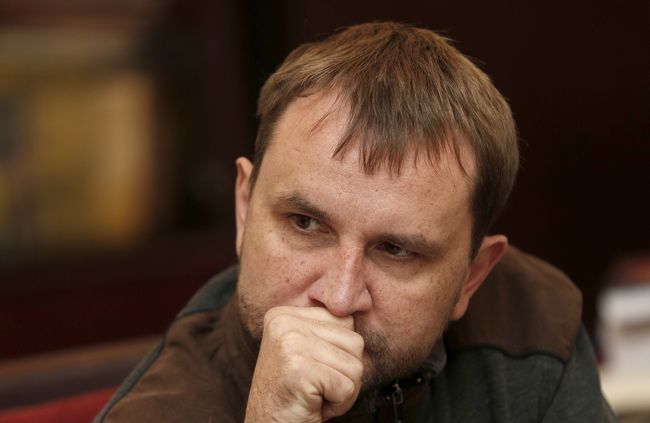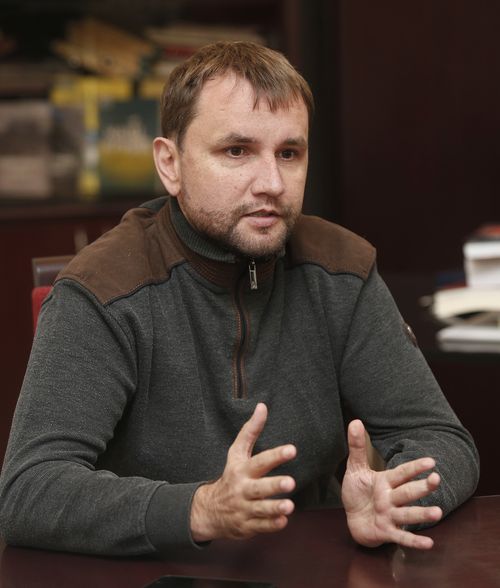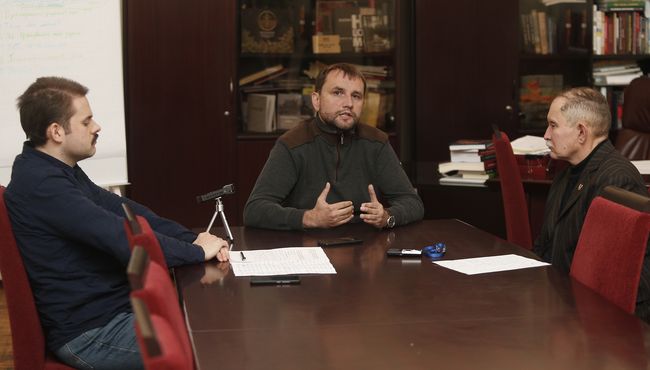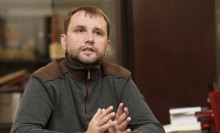Volodymyr VIATROVYCH, director of the National Institute of Remembrance, is a “highly demanded” public personality – especially now that national and historical memory is an object of deep societal concern. Therefore, the meeting of Mr. Viatrovych with Den’s journalists was a natural and long-awaited thing. We wanted our conversation with Mr. Viatrovych to be a dialog of equal and like-minded entities – our newspaper as a Ukraine-centered publication that pays close attention to history and the Ukrainian Institute of National Remembrance as a public administration body that pursues the governmental policy in this extremely sensitive field. We are comrades-in-arms, for we have a common goal – to consolidate the state-oriented historical world-view of the Ukrainian nation
There are a lot of subjects to discuss with Mr. Viatrovych. It is the ongoing process of decommunization and the related problems, interrelation between decommunization and decolonization as well as between the foundations of national memory and the practical policy in this sphere, and, naturally, a complex of problems that have resulted in the aggravation of our relations with our Western neighbor Poland and the utmost politicization of history by our partners in Warsaw. Mr. Viatrovych’s conclusion is clear: there is no alternative to a dialog.
“A LARGE NUMBER OF OUR PEOPLE HAVE NOT READ THE HISTORY OF UKRAINE AT ALL”
We consider the Institute of National Remembrance our ally and comrade-in-arms in a very important cause. Performing governmental functions to some extent, the newspaper Den has been trying to show in the past 20 years that we are not 25 years old, that Ukraine is a country with a thousand-year-long history. A well-known book series is aimed precisely at this. Since our missions are symmetrical and intersecting, I’d like to ask you to tell us briefly what your institute, an element of the executive branch of power, is doing in this direction

“First of all, I want to note that much of the national memory-related work in the 25 years of independence has been done through civic efforts because the Institute of National Remembrance had not existed as such before 2007 and it did not in fact perform its functions in 2010-13 (the Yanukovych era). It is important that the newspaper Den was carrying out an educational mission in this field, for its publications spread information about Ukrainian history. The Holodomor is perhaps one of the most important subjects the newspaper has been repeatedly broaching. Undoubtedly, the books published as a supplement to your newspaper have also played an essential role
“Since 2014, when I began to chair the Institute of National Remembrance, I have seen my mission as not to replace all the public initiatives but to complement and coordinate them. To do so, it was extremely important to grant the Institute of National Remembrance the status of a central executive power body so that it could serve as an operator of public initiatives. We are trying to support the public initiatives aimed at informing about the country’s difficult history in the early-to-mid 20th century. I mean conferences, exhibits, museum expositions and debates, presentation of films. We are working in this direction in close cooperation with the public. Our job is to cooperate with educational bodies (Ministry of Education) to improve the existing school history curriculum. There are some serious achievements in this field – we managed to seriously update the history curriculum and resolve a lot of problems the previous minister Tabachnyk artificially created in this sphere. The second field is adult education. Most of the Ukrainians are the people who did not go to Ukrainian schools and were born well before the proclamation of Ukraine’s independence. This is why a very large number of our people have not read the history of Ukraine at all. It was in fact not taught in the Soviet era, and our mission is to tell these adult people – by way of exhibits and discussions – about the moot points of Ukrainian history. Otherwise, this quite wide sphere of ignorance in Ukrainian society will turn into a field for manipulations.”
There is such thing as historical memory – it is a field of historical research, and a thing known as national memory policy – it is, to some extent, a political notion. What do you think is the difference here and how do these things correlate?
“Firstly, I want to speak of national, not historical, memory. National memory is a set of common visions of the past which turns a certain community into a nation. It does not mean that all representatives of this national community must share the same idea of history – there are, of course, discussions. But the basic things and visions must be common to everybody. For me, a nation is a minimum of the common visions of the past and a desire to live together in the future. As for the national memory policy, it means purposeful measures aimed at restoring what we call national memory. Why is the national memory policy necessary? Because the policy pursued in the communist era (Ukraine is a glaring example) was aimed at wiping out national memory, its bearers and sources, and rewriting narratives. To restore national memory, the state must make efforts – this is what the word ‘policy’ means here.”
“SUFFICIENTLY FAST REFORMS WERE ALWAYS SUCCESSFUL”
There is rather a sore subject in the focus of public attention. It is de-Communization. Do you have an impression that decommunization is sometimes carried out with old Soviet-style methods, without being sufficiently explained to the public? Why must a certain monument or a plaque be put up or, on the contrary, be torn down as a rudiment of the past?
“In my view, decommunization is a large-scale societal reform which should be regarded as one of the important preconditions for transforming Ukraine into a normal democratic state. For sufficiently fast reforms were always successful. It is always too painful for society to undergo lengthy reforms, especially in the matters that touch on mentality and societal imagination. This is why, drawing up the law, we set out rather short periods of time. It was to take six months to discuss the new names of cities and villages. These time limits were exceeded in some cases, but still we did it on time. I think decommunization was 99.9-percent successful just because it was done quickly, energetically, and was supported by the public
“In Ukraine, and still more so abroad, particularly in Poland, the Institute of National Remembrance is being demonized as a powerful organization. But, in reality, we have 39 employees based in Kyiv – we have no well-ramified structures in the regions. We are unable to pull off such a large-scale operation without community support. The latter enabled us to receive the necessary information and exert pressure on saboteurs in local self-government bodies. We did it thanks to this. We can say that decommunization was successful not only because 987 names of cities and villages and almost 52,000 names of streets were changed, but also because representatives of the public took part in discussing the new names. Decommunization was one of the largest-scale public debates on history in Ukraine in the past 25 years. Local communities were free to decide on the new name. Obviously, there may have been some ill-considered decisions at the local level. But I cannot recall any scandalous incidents when the attempts of local government bodies to simulate decommunization were successful. There were attempts of this kind in what was then Dnipropetrovsk, when there was a proposal to leave the name intact, interpreting it as one in honor of St. Peter the Apostle. This attempt was not crowned with success, and the city was renamed. There was also an attempt to rename Komsomolsk as… Komsomolsk – this time in honor of young socially active Cossacks, not the Yong Communist League. It also failed

“As for streets, even in Kyiv there are a few streets left that are still to be renamed, and we will pressure Kyiv councilors into doing so at last. We cannot treat seriously the recent complaints of some Kyiv Council members that they are fed up with renaming.”
Are there any Lenin statues left in Ukraine?
“I think there may be some left on the territory of factories and in some villages. We must do this work to the end. I am sure there are none of them left in the cities. But the capital is lagging behind – there are a few undismantled monuments left. One of the most notable ones is the monument to Shchors on Shevchenko Boulevard. It must be relocated. Although it is part of the national cultural heritage and must be preserved, it still should be taken out of the public view. Preparations are already being made to move it to the Exhibition Center.”
There is a proposal to establish a museum of Soviet-era totalitarian architecture. Do you support this idea?
“I do. This kind of museum is already being established on the territory of the former Exhibition of National Economic Achievements.”
Like in Lithuania..
“In Lithuania, Hungary, and some other post-Communist countries.”
“SPEAKING OF DECOLONIZATION, THERE ARE PRACTICALLY NO EXAMPLES FROM THE HISTORY OF OTHER COUNTRIES”
Mr. Viatrovych, you have often said that decommunization should be followed by decolonization. This is one more point, where our viewpoints coincide – we have always been writing about the need of decolonization. What is it supposed to be like? What is your vision?
“Firstly, decommunization is also a question of public awareness. The point is that removing symbols in names or monuments is only the first step. We must continue our informational and educative work – explain why these symbols were removed, why that regime was criminal, what crimes it committed. As for decolonization, I will say it has already been launched to some extent in Ukraine. It is a byproduct of decommunization because the Ukrainians have at last felt themselves masters of their own land, they are proud of having the right to rename toponyms after the persons they choose, and have begun to rename even the toponyms that are not subject to the law on de-Communization. Let me give you an example in Kyiv: Suvorov and Kutuzov streets have nothing to do with the law on decommunization, but the Kyiv community supported renaming them. As a result, we have totally different streets named, particularly, after Ukrainian National Republic military servicemen and figures of the 1917-21 national liberation movement. We can see similar processes, when decommunization triggers decolonization, all over Ukraine. This question is always raised during our debates. A few weeks ago it was proposed at a parliamentary committee meeting that a special law on decolonization is to be adopted. I am not prepared to say now if we will be drawing up a law like this. I can’t imagine it so far. Whenever we speak of decommunization, we can refer to certain examples and analogues in Eastern European countries, we have the example of denazification in postwar Germany, and, accordingly, these analogues allowed us to draw up this law quickly and adequately. As for decolonization, there are in fact no examples.”
As for imperial symbols, they are present in the West too – for example, in Hungary and Poland
“I am also taking a skeptical and negative attitude to sentimental things about the Austro-Hungarian Empire. I don’t understand the initiative, now being discussed in Chernivtsi, about putting up a monument to, so to speak, ‘grandmother Austria.’ I think these sentiments about alien empires are rather dangerous because they water down Ukrainian national identity. I equally reject monuments to Catherine II and Francis Joseph in Ukraine, even though Francis Joseph was allegedly more pro-Ukrainian than Catherine II.”
“IT IS NOW THAT THE FOUNDATION OF NORMAL PARTNERSHIP BETWEEN UKRAINE AND POLAND IS BEING LAID”
We must also broach such a widely discussed topic as Ukrainian-Polish relations. The Khlibnia gallery at St. Sophia of Kyiv recently hosted the exhibit “The Great War and Poland: 1915-18.” A historian from the Institute of Polish History spoke. He unequivocally characterized Pilsudski as a great Polish national hero, the father of Polish independence. He did it in a peremptory tone, leaving no space for doubt. Then he said a strange phrase that the Second Polish Republic was a modern-type democratic state with secure borders. I am sorry, but history vividly showed the “democracy” of that state and the “security” of its borders. The problem is that when it comes to relations between Ukraine and Poland, neither of the sides has the right to dictate to the other what national heroes it must venerate. We do not protest, for example, against the Poles considering Pilsudski this kind of hero, although he relentlessly suppressed the Ukrainian national movement in the 1920s-1930s. It is a question of sovereignty in the national memory policy. On the other hand, we cannot forget Taras Shevchenko’s words: “And you boast because we once / Brought Poland to destruction... / It is true, yes, Poland fell, / But in her fall she crushed you.” In other words, Ukraine is inseparably tied up with Poland. What are we to do with due account of this problem?
“Oddly enough, it seems to me that it is now, in a crisis situation, that the foundation of normal partnership between Ukraine and Poland is being laid. For true cooperation is only possible between equal partners. But if talking about ‘partnership’ is only a ruse to foist a viewpoint, these relations will always be short-lived and will not promote trust. Today, when Ukraine is defending its view of its own history in heated arguments, we are, at the same time, changing Poland’s overall attitude to Ukraine. I am sure that, despite the harshness of Polish politicians’ current statements, this situation will have a positive end. Our Polish neighbors will become aware of dealing with a state that honors and is prepared to defend its past and has a clear idea of sovereignty, national memory, and history. This kind of Poland can be a reliable partner of Ukraine. I am convinced that the ongoing period of excessive politicization of history and ‘historization’ of politics in Poland (when today’s politics is linked to interpretations of the past) will pass off.”
“A PROFESSIONAL APPROACH IS INSTRUMENTAL IN RESOLVING ANY PROBLEMS”
To what extent adequate do you think the reaction of Ukraine to the conflict was and what tactics should we use further on? Should we make a counterstatement to each Polish statement or, on the contrary, calmly pursue our course, trying not to aggravate the conflict? Do you think it is normal that you are in fact the only statesman who is defending the position of Ukraine in this matter?
“Taking into account that the debate is on the matters within my competence, I think it is absolutely normal that I’ve emerged as the main spokesman. If it were about energy or security, I would obviously have never intervened. A professional approach is instrumental in resolving any problems. It is very surprising that the main spokesman on the Polish side is the foreign minister who is speaking about history more than about the present day and resembles a history teacher rather than a minister of foreign affairs. It is surprising that even the president of the neighboring state deems it necessary to comment on these matters

“The problem is that, unfortunately, our country has been often showing our Western and Eastern neighbors in the past 20 years that interpretation of history is not an important question and can be a pawn in broader political games. Regrettably, the Ukrainians themselves taught their neighbors not to reckon with our views of history. Today, somewhat unexpectedly for themselves, they are forced to reckon with the Ukrainian voice. I think that if we always stand our ground, we will finally change the neighboring countries’ views on Ukraine in general and Ukrainian history in particular. I hope we will reach after all a situation when we will ‘agree to disagree’ on certain historical events and figures and will respect differences in our views. You gave a very good example of Jozef Pilsudski who is a national hero for the Poles and the founding father of Poland, but, at the same time, he is not the one the Ukrainians can venerate as a hero.”
We could recently watch alarming signals during the independence march in Warsaw, where there was the following slogan among the other: “Let us not forget Lwow and Wilno.” Some observers interpret such calls as marginal, but the Polish opposition has urged the interior minister to resign. There were almost 50,000 participants in the march. Do you think it is serious?
“Unfortunately, it is serious. We can see that claims to Lviv, Vilnius, and the so-called Kresy [borderlands. – Ed.] occur not only in the discourse of marginal groups, but also in the statements of more respectable political forces that are often linked to major Polish politicians. I think the public demonstration of these slogans, all the more so on Poland’s Independence Day, became possible, to a considerable extent, due to excessive politicization of history by Polish politicians who are striving to deny the Ukrainians the right to have their own visions of history.”
“UKRAINE IS NOT PREPARED TODAY TO ALLOW ANYBODY TO IMPOSE THEIR VISION OF THE PAST ON IT”
Do you think the reason is that they consider us weak?
“I think the reason is that Ukraine has looked weak in the past 20 years and the Ukrainians allowed others to impose their vision of history on them. At the same time, it greatly surprises me that the Polish leadership is so much cut off from reality – they obviously lack experts who could explain to them that today’s Ukraine, the post-Maidan Ukraine, radically differs from the Ukraine of yesterday. Ukraine is not prepared today to allow anybody to impose their visions of the past on it – particularly, because we have a very fresh experience of such attempts on the part of Russia.”
There is an opinion that weakness of the Ukrainian position in this and other conflicts with Poland is caused by, among other things, the fact that Polish researchers have managed to gather a much larger amount of materials in the past few decades. Do you, the head of a state-run institution, feel adequate support from the academic community? Are Ukrainian historians putting up a united front in this conflict?
“Indeed, Ukrainian historiography is weaker today than that of Poland – at least because Polish historiography has never been destroyed, even under communism. When history was being rewritten for the sake of ideology, emphasis was put on, above all, the 20th century, while the older history of Poland was in fact left intact. After the fall of communism, historiography in Poland had far better initial opportunities than in Ukraine. Let me remind you that some major history schools were liquidated in Ukraine and many bearers of historical knowledge were destroyed physically. Many archives were closed or eliminated, as was a great deal of literature. In the 1990s, we had to start almost from scratch. But we also have some advantages. In spite of everything, history is not excessively politicized in Ukraine, as it is in Poland. Heated professional debates on various issues, including World War Two, are possible in Ukraine, whereas in Poland there is less and less place for discussions as well as an ever-increasing governmental diktat about certain historical issues.”
“POSITIONING ONESELF AS A VICTIM OF HISTORY HAS BEEN A CHARACTERISTIC FEATURE OF POLISH MENTALITY SINCE ANCIENT TIMES”
In spite of this, do you think there still are the successors of Jerzy Giedroyc and Jacek Kuron in Poland?
“Undoubtedly, such people do exist, but, unfortunately, they usually represent civil society and intellectual circles and have rather a limited impact on the sociopolitical situation in the country. The vast majority of those in power are people of right-wing populist views who closely follow the moods of the ‘street political beau monde’ which is guided by emotions rather than reason.”
Tellingly, the ruling party’s rating is not falling
“It is not falling, it is even growing. It’s quite unexpected because an election is usually followed by a year of some disappointment. Obviously, Polish politicians are playing very skillfully on societal moods, especially when it comes to history. Immersion into history is much more typical of Polish, rather than Ukrainian, society. The Ukrainians show much less interest in history. On the one hand, it is bad because, as a result, we know it less. On the other hand, this may be somewhat positive, taking into account that historical questions are now an integral part of politics in today’s Poland. Polish politicians managed to tempt society with simple answers to complicated historical questions. There was a demand in Polish society for feeling as a victim of history to whom everything is allowed. Positioning oneself as a victim of history has been a characteristic feature of Polish mentality since ancient times.”
Do you share the opinion that, in spite of the aforesaid, there is no alternative to a dialog and mutual understanding based on mutual respect?
“There is no alternative indeed to a dialog and cooperation, for a refusal to do so can only prompt the aggressive eastern neighbor to swallow up both countries. It is sad that we are having problems today with the Polish force that ran for power under the slogan of a threat from Russia. But now that this threat is real, they pretend not to notice it and are simulating a threat on the part of Ukraine. But I am convinced that it is a temporary thing. Poland is a country with an ancient culture and long-established democratic traditions, and it will manage to ‘outgrow’ this leadership and cultivate the forces that will be ready to hold out their hand to Ukrainians.”







